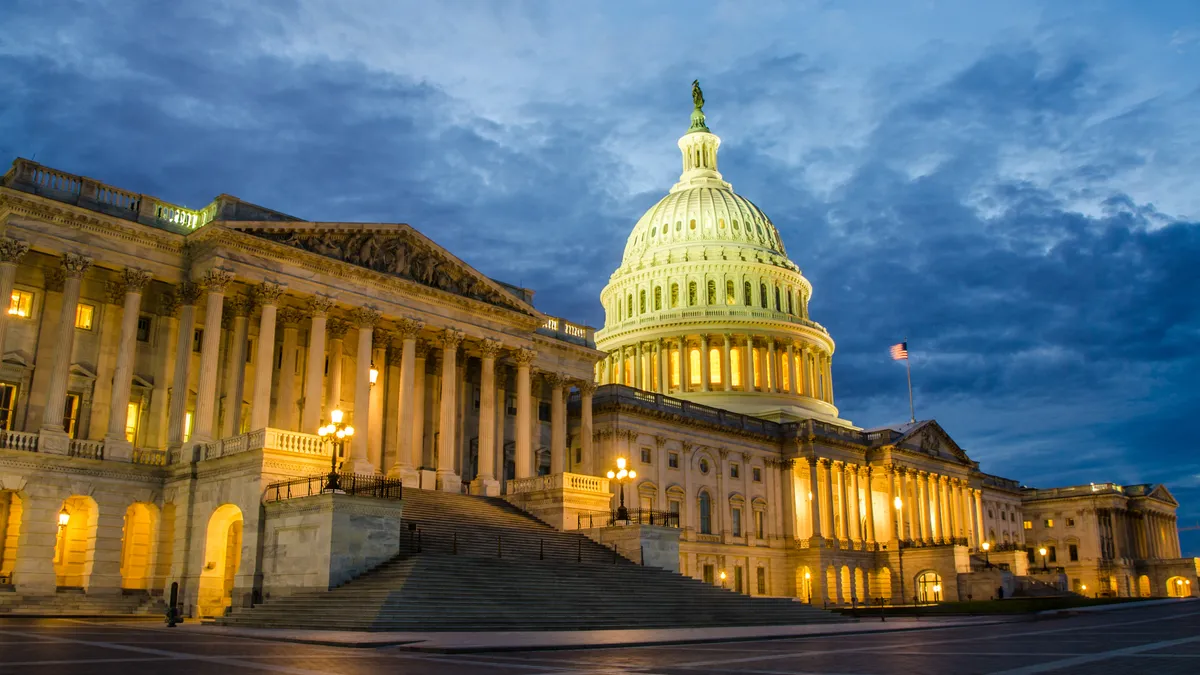Dive Brief:
- A resolution that would nullify the Biden administration's recent final Title IX rule cleared the House Committee on Education and the Workforce on Thursday over the objections of Democrats who argue the rule strengthens protections for LGBTQ+ students.
- In the same session, the committee advanced seven other education bills on topics ranging from supporting Holocaust education resources and limiting foreign influence in schools to mandating public disclosure of colleges' investigative processes for Title VI civil rights complaints.
- The legislation now goes to the full House for consideration. But with a busy congressional agenda during this presidential election year, it's unclear how far the measures will advance.
Dive Insight:
HJ Resolution 165 invokes the Congressional Review Act in an attempt to repeal the controversial final Title IX regulations released in April by the U.S. Department of Education.
The Congressional Review Act allows Congress to overturn certain federal agency actions. A joint resolution of disapproval would need backing from both houses of Congress and the signature of the president for the rule to be repealed. Congress could also override a presidential veto.
Lawmakers have 60 congressional days from release of the Title IX rule on April 19 to introduce a joint resolution of disapproval. Meanwhile, schools are required to comply with the final rule as of Aug. 1.
GOP supporters of the resolution said repealing the rule would protect the safety of women and girls and their access to educational opportunities. But Democrats on the committee said the rule makes progress in addressing sexual harassment, assault and discrimination in K-12 and higher education, while also preserving the due process rights of those accused in Title IX cases.
Rep. Bobby Scott, D-Va., ranking minority member on the House education committee, urged his colleagues members to reject the resolution. "By expanding critical protections under the law, the new regulations help ensure that all students, including LGBTQI+ students, are fully protected from discrimination based on sex, sexual orientation, and gender identity," Scott said ahead of the vote.
It nonetheless passed along party lines.
Of the seven remaining education items cleared by the committee Thursday, five advanced along party lines while the other two had bipartisan support.
Here are the bills that passed with political divide:
- HR 8648 — Republicans said the Civil Rights Protection Act of 2024 would increase transparency by requiring public disclosure of colleges' investigative processes for Title VI civil rights complaints. They also said it would ensure the Office for Civil Rights investigates Title VI complaints properly.
Democrats said they appreciate the need to address antisemitism on college campuses, but argued that the bill would not dedicate funding to support the efforts and therefore could contribute to a backlog in OCR cases. - HR 6816, HR 5567 and HR 8649 — GOP lawmakers said these bills would ensure transparency when K-12 schools receive funding from "foreign sources," as well as allow parents to know if any school materials are funded by foreign governments and foreign entities of concern.
One bill — HR 5567 — would prohibit K-12 schools from receiving funds from or entering into contracts with the Government of the People’s Republic of China and the Chinese Communist Party.
Scott, in addressing HR 6816, the Promoting Responsible Oversight To Eliminate Communist Teachings for Our Kids Act, said, "This bill is a solution in search of a problem, given that we have no data to suggest that any claimed influence is even occurring in K-12 schools, or if the Chinese government wanted to have such influence, how they would do it."
- HR 8534 — The Protecting Student Athletes’ Economic Freedom Act would prohibit a student athlete from being considered an employee of an institution, a conference, or an association based on participation in certain intercollegiate athletics. Committee Chair Rep. Virginia Foxx, R-N.C., said in a statement that the bill would shield "student athletes from misguided designations as employees by an activist National Labor Relations Board."
Scott said the bill is an "overly broad piece of legislation that will strip students of their rights under labor and employment law, state or federal. This will block any effort to form a union, expect a minimum wage, or even to demand equal pay for equal work."
These are the two bills that passed with bipartisan support:
- HR 8606 — Known as the Never Again Education Reauthorization and Study Act of 2024, this bill would extend the U.S. Holocaust Museum’s mandate to disseminate Holocaust education resources through fiscal year 2030. It also would call for a study on Holocaust education in public schools.
- HR 7227 — The Truth and Healing Commission on Indian Boarding School Policies Act of 2024 aims to study Indian boarding schools and their abusive policies and practices and the impact on Indigenous communities and their descendants.
In her statement after the markup, Foxx said, "Our nation’s education and workforce systems face tremendous challenges, but I am confident that the legislation passed today will strengthen student learning, bolster academic freedom, and pave the way for a stronger, more prolific workforce."












